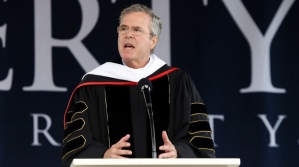
Former Florida Gov. Jeb Bush made a commencement speech at Liberty University in Virginia on Saturday to defend the concept of "Christian conscience."
According to Beth Reinhard of the Wall Street Journal, Bush declared that "there is no more powerful or liberating influence on this earth than the Christian conscience in action." He used part of his speech to attack the Affordable Care Act, accusing President Barack Obama of "supporting the use of coercive federal power" in the form of making employers offer contraceptives in their insurance plans; the president later supported an exemption that allowed third-party insurers to cover birth control.
"What should be easy calls in favor of religious freedom have instead become an aggressive stance against it," Bush said in front of the graduates and their families. "Somebody here is being small-minded and intolerant, and it sure isn't the nuns, ministers and laymen and women who ask only to live and practice their faith."
Bush, who is a Catholic according to Reinhard, made a larger point on what he thought was excessive government intervention.
"Federal authorities are demanding obedience, in complete disregard of religious conscience-and in a free society, the answer is no," Bush said.
Reinhard reported that although he opposes same-sex marriage and favors limits on abortion, Bush only made a slight reference to the latter in his speech.
"Wherever there is a child waiting to be born, we say choose life, and we say it with love," Bush said.
However, the Wall Street Journal reported that some conservatives still saw Bush, a potential Republican presidential candidate, with suspicion, given his stances on "legalizing undocumented immigrants" and supporting "Common Core national academic standards." He also used his speech to position himself as a person who could help the poor and middle class.
"For all who would serve the poor and homeless, you set the standard with your belief that everyone matters, and that everyone has the right to rise," Bush said.
Mollie Hemingway of The Federalist thought that Bush did a good job of defending Christianity and religious freedom in his speech. Even though he spoke at a Christian university, Bush addressed the criticism that Christianity was a "backward and oppressive force."
"It's a depressing fact that when some people think of Christianity and of Judeo-Christian values, they think of something static, narrow, and outdated," Bush said. "We can take this as unfair criticism, as it typically is, or we can take it as further challenge to show in our lives the most dynamic, inclusive, and joyful message that ever came into the world."
Bush then made references to Christian persecution around the world. He argued that without the presence of Christians, the world would be a vastly different place.
"Consider a whole alternative universe of power without restraint, conflict without reconciliation, oppression without deliverance, corruption without reformation, tragedy without renewal, achievement without grace, and it's all just a glimpse of human experience without the Christian influence," Bush said.
Based on Bush's speech, Hemingway argued that it was "untrue" and "a little ungrateful" to pit the Christian faith against "enlightened thought."
"Whether or not we acknowledge the source, Hebrew Scripture and the New Testament still provide the moral vocabulary we all use in America - and may it always be so," Hemingway wrote.






